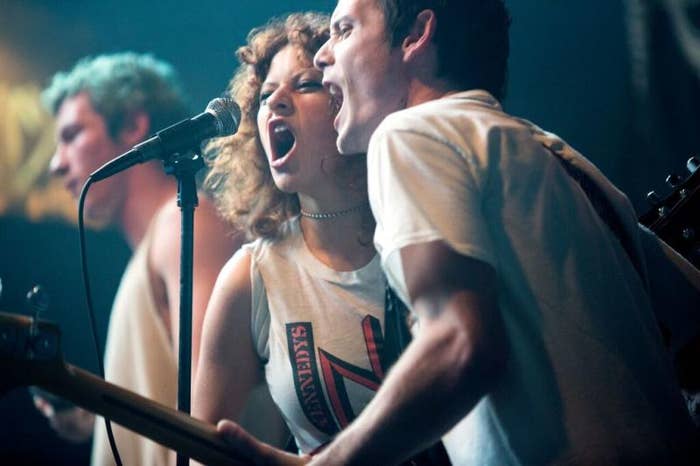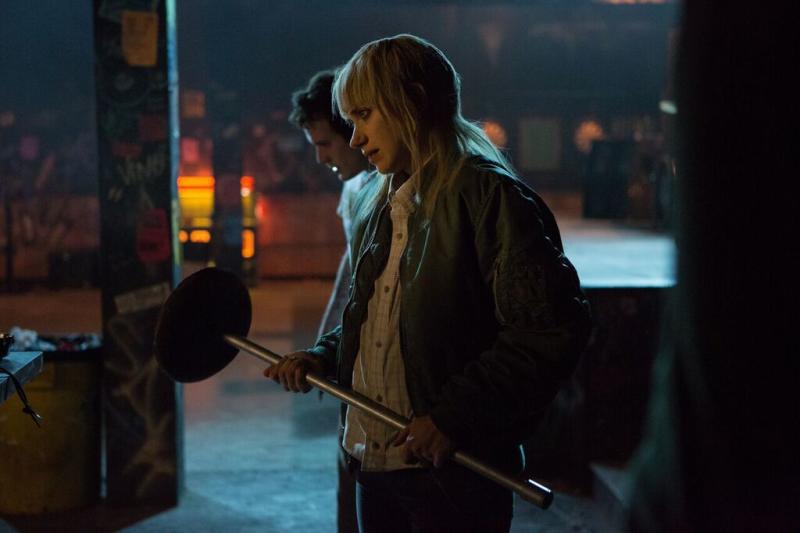
Following the heavily-hyped horror film The Witch, the latest and most buzz-worthy thrill from A24 Films is Green Room, director Jeremy Saulnier's bloody follow-up to 2014's revenge thriller Blue Ruin. Green Room follows a hardcore punk band that plays the wrong gig at the wrong venue and finds themselves trapped in a green room after witnessing the venue's neo-Nazi owners commit murder. Unarmed, untrained, and scared shitless, they're forced to fight for their lives in order to escape, but it kick-starts with a nauseatingly gory turn that makes their return to safety near impossible. Alia Shawkat and Anton Yelchin star as band members, with Imogen Poots as the murdered girl's friend who gets trapped in the room with them. Saulnier's muse Macon Blair (from Blue Ruin) stars as one of the neo-Nazis, while their leader is played by the one and only Patrick Stewart—quiet, calm, and collected but somehow still scary as hell. "We didn’t give him big monologues," Saulnier says. "He’s someone with a certain stature. It’s his presence—his implied being—that circles the whole movie. Patrick and I realized that he gives his quietest performance of his career—stage or screen. His character had to be downplayed and brutally pragmatic. The whole thing is that he doesn’t really come unraveled."
The movie does unravel, though, turning what could just be an indie music drama into a terrifying game of cat-and-mouse. It's an insane horror plot that seems to have sprouted from director/writer Saulnier's twisted mind, but the story has realer roots than one might expect. Growing up in D.C., Saulnier was in a hardcore punk band himself, so the scene is ripped out of the pages of his teenage memories. The fictional band, the Ain't Rights, is based off his own band and his friends' as well. In person, Saulnier's appearance and mannerism are eerily reminiscent of Anton Yelchin, who plays the protagonist in the film. "Oh for sure, there’s a little bit of me in a lot of the characters," he confirms. "There’s a real Tiger [Callum Turner], there’s a real Sam [Alia Shawkat], and Pat [Anton Yelchin] is this sort of hybrid of me and a lot of people I know. And Reece [Joe Cole], the drummer, is based on a few people I know, too. So it’s all very personal."
The punk band part isn't that unusual, but he did have actual run-ins with neo-Nazis. "I was very young, and very out of my depth," Saulnier says. "I was 15, 16, 17 when I was going to these hardcore shows in D.C. There were Nazi skinheads at shows—not a ton of them, but they did attract violence." They weren't the majority in the scene ("No one wanted them there, no one wanted swastikas in the pit," he recalls), but there were enough for him to notice. And they always attracted violence.

There was one experience that was particularly traumatizing to a young Saulnier. "I remember walking through blood," he says. "There was a stabbing outside of the show. I wasn't involved, but when you are that young and you are from suburban Virginia, it feels very unsettling, the cult shit. Why are they stabbing each other? You don’t quite get it."
"They called off the show and people left," he continues. "There was a big puddle of blood. These things happened. I was certainly scared shitless. It stuck with me." What scared Saulnier is nothing compared to what he puts his characters through in Green Room. Saulnier refuses to market his movie as a horror film, but don't let that downplay the horrors of the film. "I don’t want to exploit my characters' deaths, but when there’s a non-fatal wound, you will find me getting a nice close-up of that." This is where that nauseatingly gory turn comes in. Yelchin's Pat takes a hit early on, with a stomach-churning arm injury that's almost too much for a character that isn't meant to be part of the body count.

It's about an hour of pure tension before the shit hits the fan—but when it hits, it hits harder than you're ready for. "The fun part of Green Room is you get deprived of expectations and it builds so much that when it unleashes it’s like, 'No. No. Come back,'" Saulnier says. "It turns brutally and abruptly and it doesn’t stop from there. It had to have the impact of real violence. The references for that were real and terrible. Machetes are terrible tools and they are used, unfortunately, throughout the world. It made sick, but boy it elicits an involuntary response from people. It’s to say, 'We are really in it now and now I don’t feel safe because I think everyone is going to die.'"
The senseless violence feels especially inescapable because of the claustrophobic, single-location format. If it wasn't obvious from the title, the green room was crucial to building Saulnier's cinematic world. Usually, he'll scout a film location and adapt his movie to it, but for Green Room, he had the venue built so it was exactly to his liking. "The only way to do this was to build it from scratch during pre-production," he says. "I had written the script in so much detail based on spatial relationships, adjacent hallways, and rooms where everything lined up. We had to build the entire concert venue. You almost feel guilty. It’s my first movie where I had to create the world instead of taking what is available and bending to that world." The room really comes alive at the end, when it becomes a hide-and-seek face-off in a venue-turned-maze.
Since Saulnier came up in the scene, this is an idea he's had for over a decade, but he felt he couldn't create the hyper-dramatized version found in Green Room until this moment. The sleeper success of Blue Ruin is what made this film possible for him. He knew it was going to be an uphill battle—after all, it is a movie about Nazi skinheads and punks getting in brutal scraps with each other. But after the reception of his last film, he said, "Holy shit, this is my one and only shot."
'Green Room' is out April 15 (limited) and then April 29 (wide).

